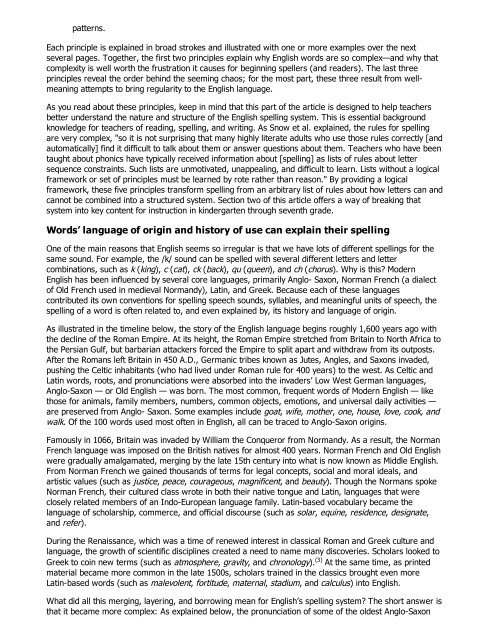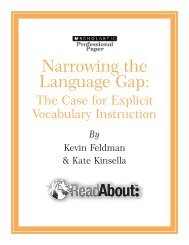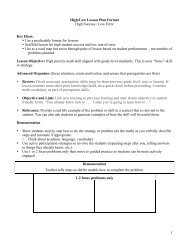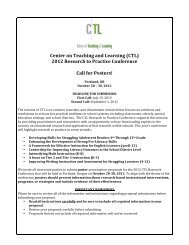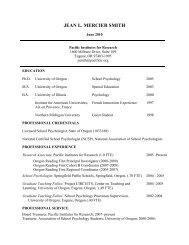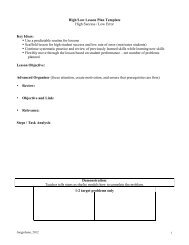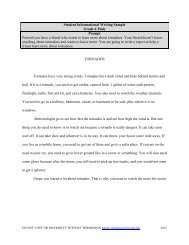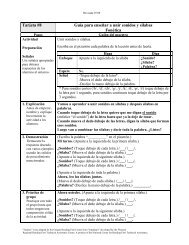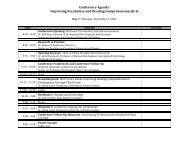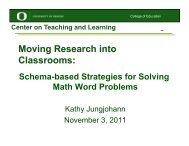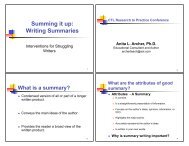How Spelling Supports Reading - Center on Teaching and Learning
How Spelling Supports Reading - Center on Teaching and Learning
How Spelling Supports Reading - Center on Teaching and Learning
You also want an ePaper? Increase the reach of your titles
YUMPU automatically turns print PDFs into web optimized ePapers that Google loves.
patterns.Each principle is explained in broad strokes <strong>and</strong> illustrated with <strong>on</strong>e or more examples over the nextseveral pages. Together, the first two principles explain why English words are so complex—<strong>and</strong> why thatcomplexity is well worth the frustrati<strong>on</strong> it causes for beginning spellers (<strong>and</strong> readers). The last threeprinciples reveal the order behind the seeming chaos; for the most part, these three result from wellmeaningattempts to bring regularity to the English language.As you read about these principles, keep in mind that this part of the article is designed to help teachersbetter underst<strong>and</strong> the nature <strong>and</strong> structure of the English spelling system. This is essential backgroundknowledge for teachers of reading, spelling, <strong>and</strong> writing. As Snow et al. explained, the rules for spellingare very complex, "so it is not surprising that many highly literate adults who use those rules correctly [<strong>and</strong>automatically] find it difficult to talk about them or answer questi<strong>on</strong>s about them. Teachers who have beentaught about ph<strong>on</strong>ics have typically received informati<strong>on</strong> about [spelling] as lists of rules about lettersequence c<strong>on</strong>straints. Such lists are unmotivated, unappealing, <strong>and</strong> difficult to learn. Lists without a logicalframework or set of principles must be learned by rote rather than reas<strong>on</strong>." By providing a logicalframework, these five principles transform spelling from an arbitrary list of rules about how letters can <strong>and</strong>cannot be combined into a structured system. Secti<strong>on</strong> two of this article offers a way of breaking thatsystem into key c<strong>on</strong>tent for instructi<strong>on</strong> in kindergarten through seventh grade.Words’ language of origin <strong>and</strong> history of use can explain their spellingOne of the main reas<strong>on</strong>s that English seems so irregular is that we have lots of different spellings for thesame sound. For example, the /k/ sound can be spelled with several different letters <strong>and</strong> lettercombinati<strong>on</strong>s, such as k (king), c (cat), ck (back), qu (queen), <strong>and</strong> ch (chorus). Why is this? ModernEnglish has been influenced by several core languages, primarily Anglo- Sax<strong>on</strong>, Norman French (a dialectof Old French used in medieval Norm<strong>and</strong>y), Latin, <strong>and</strong> Greek. Because each of these languagesc<strong>on</strong>tributed its own c<strong>on</strong>venti<strong>on</strong>s for spelling speech sounds, syllables, <strong>and</strong> meaningful units of speech, thespelling of a word is often related to, <strong>and</strong> even explained by, its history <strong>and</strong> language of origin.As illustrated in the timeline below, the story of the English language begins roughly 1,600 years ago withthe decline of the Roman Empire. At its height, the Roman Empire stretched from Britain to North Africa tothe Persian Gulf, but barbarian attackers forced the Empire to split apart <strong>and</strong> withdraw from its outposts.After the Romans left Britain in 450 A.D., Germanic tribes known as Jutes, Angles, <strong>and</strong> Sax<strong>on</strong>s invaded,pushing the Celtic inhabitants (who had lived under Roman rule for 400 years) to the west. As Celtic <strong>and</strong>Latin words, roots, <strong>and</strong> pr<strong>on</strong>unciati<strong>on</strong>s were absorbed into the invaders’ Low West German languages,Anglo-Sax<strong>on</strong> — or Old English — was born. The most comm<strong>on</strong>, frequent words of Modern English — likethose for animals, family members, numbers, comm<strong>on</strong> objects, emoti<strong>on</strong>s, <strong>and</strong> universal daily activities —are preserved from Anglo- Sax<strong>on</strong>. Some examples include goat, wife, mother, <strong>on</strong>e, house, love, cook, <strong>and</strong>walk. Of the 100 words used most often in English, all can be traced to Anglo-Sax<strong>on</strong> origins.Famously in 1066, Britain was invaded by William the C<strong>on</strong>queror from Norm<strong>and</strong>y. As a result, the NormanFrench language was imposed <strong>on</strong> the British natives for almost 400 years. Norman French <strong>and</strong> Old Englishwere gradually amalgamated, merging by the late 15th century into what is now known as Middle English.From Norman French we gained thous<strong>and</strong>s of terms for legal c<strong>on</strong>cepts, social <strong>and</strong> moral ideals, <strong>and</strong>artistic values (such as justice, peace, courageous, magnificent, <strong>and</strong> beauty). Though the Normans spokeNorman French, their cultured class wrote in both their native t<strong>on</strong>gue <strong>and</strong> Latin, languages that wereclosely related members of an Indo-European language family. Latin-based vocabulary became thelanguage of scholarship, commerce, <strong>and</strong> official discourse (such as solar, equine, residence, designate,<strong>and</strong> refer).During the Renaissance, which was a time of renewed interest in classical Roman <strong>and</strong> Greek culture <strong>and</strong>language, the growth of scientific disciplines created a need to name many discoveries. Scholars looked toGreek to coin new terms (such as atmosphere, gravity, <strong>and</strong> chr<strong>on</strong>ology). (3) At the same time, as printedmaterial became more comm<strong>on</strong> in the late 1500s, scholars trained in the classics brought even moreLatin-based words (such as malevolent, fortitude, maternal, stadium, <strong>and</strong> calculus) into English.What did all this merging, layering, <strong>and</strong> borrowing mean for English’s spelling system? The short answer isthat it became more complex: As explained below, the pr<strong>on</strong>unciati<strong>on</strong> of some of the oldest Anglo-Sax<strong>on</strong>


